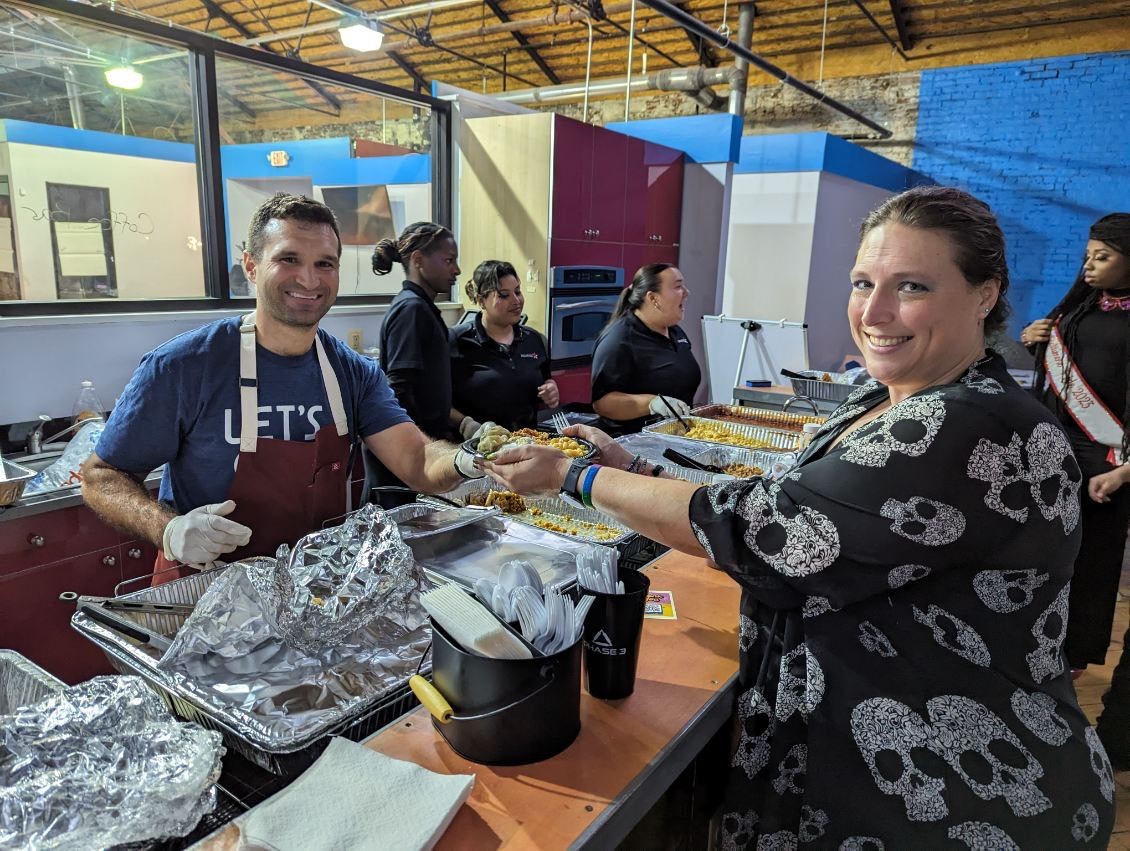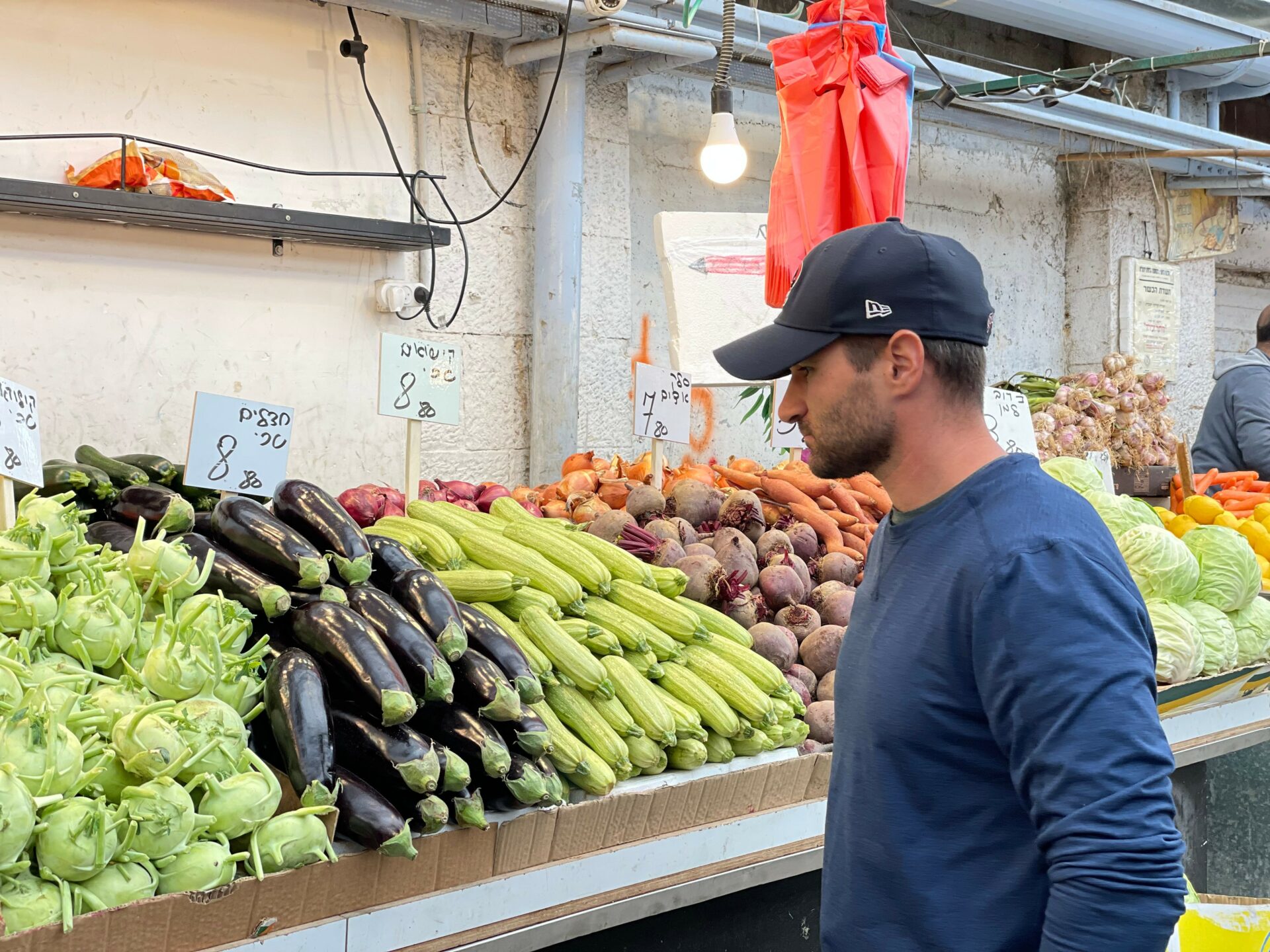Alright – so today we’ve got the honor of introducing you to Jordan Foley. We think you’ll enjoy our conversation, we’ve shared it below.
Hi Jordan, really happy you were able to join us today and we’re looking forward to sharing your story and insights with our readers. Let’s start with the heart of it all – purpose. How did you find your purpose?
I am an active-duty Lieutenant Commander in the U.S. Navy and have served for 12 years as a submarine officer and now as a Judge Advocate (JAG). I am currently serving as the National Security Law Department Head for Naval and Maritime Law at the Pentagon. In 2019, while I was working full time and putting myself through law school, I decided to start a nonprofit helping veterans and military spouses start culinary businesses after experiencing the death by suicide of a close Navy friend who failed while trying to start up a food service company. In order to teach and train culinary businesses, I started using food trucks as a microcosm of the culinary industry. Our food truck training focuses on everything from menu sourcing, to mincing onions, to marketing in a hands-on approach. That veteran or military spouse never pays tuition and actually earns money through stipends and food sales.
On paper, I am a national security professional. I’ve served on submarine deployments, speak Mandarin Chinese, and advise Admirals on the law of armed conflict. The culinary industry was a leap for me, but it was also familiar. I grew up in a big family and learned how to cook at a young age with my grandmother who also worked as a short order cook at a local bar in a small steel town north of Pittsburgh. During law school, in order to professionalize my cooking skills and understanding of the culinary business, I also attended culinary school at a local community college and earned my culinary arts and entrepreneurship certificates in 2021. In four years of running my nonprofit as a part-time, unpaid Founder, CEO, and Head Chef, we’ve helped over 50 small businesses train in our first of its kind mobile culinary school for veterans.
I’m on a mission to revitalize America’s Main Street culinary scene. It’s my life’s work to reduce the high fail rates restaurants see in their first few years and build local culinary culture through training and education for aspiring restaurateurs and chefs.
I grew up in a steel town and watched businesses, one-by-one, close their doors after the mill shutdown. I still remember walking downtown passing the silver arches home to Pee Wee’s Hot Dog Shop and going into Burger Hutt to get a flat top cheese burger, gravy fries, and handspun strawberry milkshake. These places are now just memories. Their recipes and atmosphere are gone forever. The buildings remain vacant, but I’m not losing hope. I believe Main Streets like this all across America are an opportunity for aspiring chefs to launch the next great restaurant and build community.
Starting a restaurant is hard work. Fail rates exceed sixty percent in the first year and only one out of every five restaurants make it past their fifth anniversary. It can be even harder for at-risk and underrepresented populations. For veterans, military spouses, and military-connected refugees, my company, Let’s Chow, assists culinary entrepreneurs in developing product-market fit, sourcing, and menu testing through our food truck training program. My training as an attorney, chef, and military officer has prepared me to advance and protect food business vitality through national, state, and local advocacy. I will continue to fight for the food industry at every level of my career.
Let’s take a small detour – maybe you can share a bit about yourself before we dive back into some of the other questions we had for you?
Since starting my nonprofit, Let’s Chow, in 2020, we have grown to five food trucks nationwide and this year we are training 18 businesses and four of which are Afghan refugees who served as interpreters for the U.S. In four years, we helped train, startup, and increase profitability for over 45 small businesses. I also fly around the country to military bases to provide live cooking demonstrations for military families. These demonstrations are accompanied by a video of the healthy, low-cost recipe. The families sample the food and get a basket of groceries used in the recipe to take home. Over 40 percent of military families experience food insecurity, so this education initiative is helping reduce those numbers.
With five food trucks in Atlantic City, Baltimore, DC, Miami, and San Diego, my organization supplements food insecurity operations and provides training for our students in those areas. These trucks develop regional businesses, and many entry-level students are in the program develop their culinary skills to one day become the businesses owners they dream of. The impact is not only through business development, but much of our operations involve meal donations. In our program, a donation of $4 provides one hot meal for a person in need and 15 training minutes for a veteran.
Locally, I use my training as an attorney to influence food laws that are discriminatory or unfair. For example, I work with the county in Maryland where I live to increase the amount of Spanish speaking resources available for mobile food licensing through legislation. I’m using my Chinese language ability to create Chinese versions of the same instructions. Currently, the county only offers English language resources despite over 15 percent of the population claiming Spanish as a first language and 2 percent Mandarin Chinese.
If you had to pick three qualities that are most important to develop, which three would you say matter most?
As a Naval Officer and attorney, my commitment to ethics is unparalleled. Much of my job as a military national security attorney is ensuring the legality of military operations around the world. U.S. credibility and adherence to law is vital to our global presence and maintenance of peace. As a nonprofit leader, ensuring proper stewardship and transparency of donor funds is vital to our national operations. Through engrained military attention to detail, I account down to the penny where donor money goes and produce periodic impact reports highlighting our organization’s commitment to ensuring we are carrying out our missions of helping veterans and military spouses start culinary businesses and combatting food insecurity.
As a submarine officer, I was in charge of all reactor maintenance, which meant all of our paperwork and reporting dealt with nuclear power. Lying or manipulating a single number on a report could diminish the public’s confidence in the safety of our Navy nuclear power propulsion program.
Last, my commitment to being true to myself and family and those businesses I serve is the most important thing I provide to the industry. I started this company because I am still grieving the loss of a friend to suicide. It is my hope that through honesty and integrity, I can help veterans achieve the American dream and give them the purpose my friend was so desperately searching for after leaving the military.
Awesome, really appreciate you opening up with us today and before we close maybe you can share a book recommendation with us. Has there been a book that’s been impactful in your growth and development?
I was thrust into leadership positions early in my Navy career. While I was a Midshipman at the U.S. Naval Academy, I was selected as the Brigade Commander, which is similar to being a class president. After graduation in 2012, I became a submarine officer and was in charge of multiple divisions of Sailors. I had to be an advisor, friend, financial consultant, and shoulder to cry on for over 40 Sailors. Leading people in the Navy is especially challenging because the leadership doesn’t stop after work. Many times, I’d have to go settle domestic disputes or pick up Sailors in town after midnight. These experiences made me a parent before I became a parent to my two wonderful daughters many years later. I’m better for it. Leadership development from my Naval training allows me to be a better nonprofit leader. I am working with veterans, active-duty members, military spouses, and refugees on a daily basis while balancing my current job at the Pentagon where I am the chief attorney for the Department of Defense in all maritime law issues worldwide. The ability to be efficient with my time and provide concise, direct orders has helped me run my business and train the people starting up their own culinary careers.
The military regiment is one thing, but the empathy I’ve developed over the years has proven invaluable. Oftentimes I’d work with Sailors who came from different backgrounds, immense poverty, or have been discriminated against most of their lives. Those experiences helped me prioritize the mental and physical health of the people I’m training. Giving new businesses the grace and respect they need to succeed while fighting against discriminatory and predatory systems in place is how my military leadership training adds the most value to my role in the industry.
Contact Info:
- Website: www.LetsChow.org
- Instagram: https://www.instagram.com/chow_nonprofit/
- Facebook: https://www.facebook.com/Chownonprofit
- Linkedin: https://www.linkedin.com/company/64539684/ and https://www.linkedin.com/in/jordan-j-foley-6b980818b/
- Twitter: https://twitter.com/Chow_nonprofit
- Other: https://open.spotify.com/playlist/3o2PS69jheZjYHmOllXsq5?si=9e9c2d6e376c474b&nd=1&dlsi=4bd5ed303afd490f















